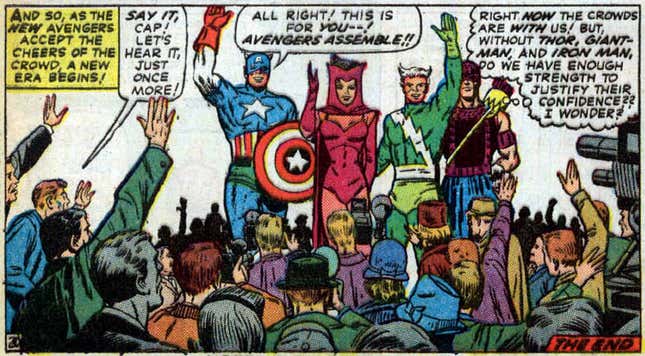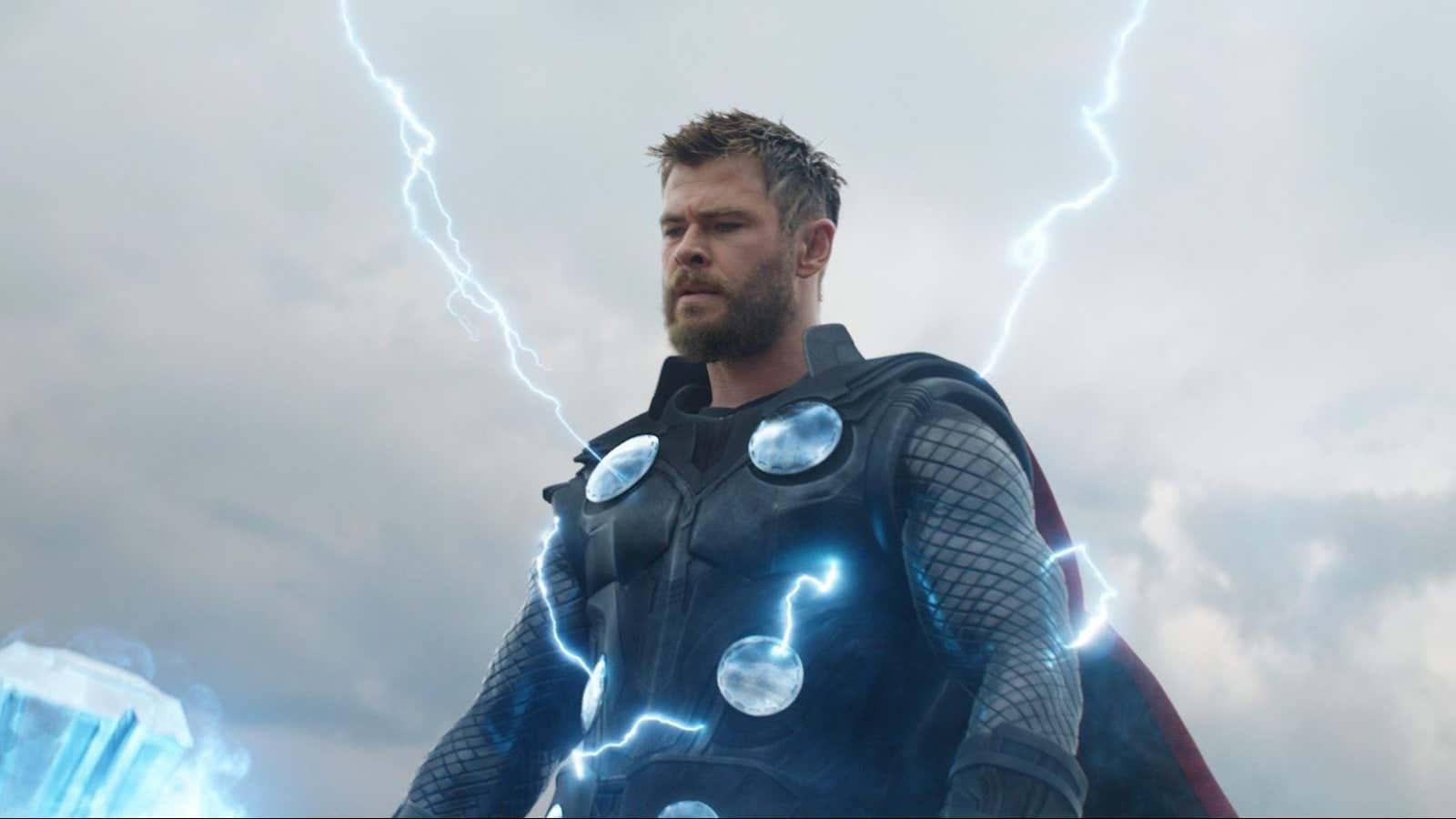Would you like to be an Avenger? On the one hand, what an honor, to run toward supervillains stone-faced in a cool V-formation! On the other hand, ack: That is definitely a job title that gives you a lot to live up to.
Fans expect that Avengers: Endgame —the latest installment of the Marvel movie franchise, which opens April 26—will see at least some members of the original core team of superheroes—Thor, Iron Man, Captain America, the Hulk, and Black Widow—stepping down, whether to enjoy a peaceful retirement or because they are now super-dead. (Data compiled by US-Bookies.com says Black Widow has the best odds of making it out of Endgame alive at 10 to 1, while the noble Captain America has only a 50-50 chance.) This will make more room in the Avengers movies for a newer, younger roster of superheroes, including Black Panther, Spider-Man, Doctor Strange, and Captain Marvel.
This is a lot of pressure, being a part of a high-profile team that’s always in the public eye, even if you can already shoot webs out of your wrists or channel your powers of meditation to transcend the shackles of space and time. And the new Avengers will inevitably face comparisons with their legendary predecessors. “Iron Man had advanced degrees in physics and electrical engineering,” a news anchor will say dismissively when Spider-Man announces his college major. And you know gender is going to be a thing for Captain Marvel: “Cap had such nice, rational, all-American super-soldier-serum blood, none of this emotional blue Kree nonsense.”
If you’re worried about the psychological fate of the newer Avengers—or if you personally have ever psyched yourself out when faced with a big opportunity—take heart. Experts say that it’s perfectly normal to question your abilities when you’re stepping into a new role.
With a healthy attitude, you can even turn insecurity into an asset.
A history of self-doubt
Marvel’s comic-book history shows that superheroes are often prone to self-doubt. As early as 1965, in issue number 16, Marvel was shuffling the Avengers lineup. Standing before a cheering public, Hawkeye smiles and waves while enmeshed in an anxious inner monologue: “Right now the crowds are with us! But without Thor, Giant-Man, and Iron Man, do we have enough strength to justify their confidence??” Although the panel’s bright color palette and the heroes’ raised arms depict a celebratory moment, Hawkeye’s thought bubble offers the reader a glimpse into the neuroses that power the Marvel universe.

“There’s an element to the Avengers even at that time, where they’re like, ‘We’re not as good as the originals,'” says Sean Howe, author of Marvel Comics: The Untold Story. “I think one of the things Marvel staked its ground on was that they had characters who were filled with insecurity.”
Marvel heroes’ frequently dark origin stories meant that they were prone to feeling ill-equipped for their high-pressure jobs; after all, they never asked to save the universe. “They’re conscripted into this life,” says Howe. The Hulk got big and smash-y because he was exposed to an atomic blast; Daredevil gained his powers at the cost of losing his sight. “They are dealing with a lot of psychological baggage,” Howe notes, “so they’re already kind of primed to feel insufficient as role models.”
Much like the beleaguered heroes of the Marvel universe, a lot of everyday people feel plagued by insecurity when they come into new powers, says Rebecca Badawy, an assistant professor of management at Youngstown State University in Ohio who researches imposter syndrome. “That’s a normal experience of imposterism, but it’s expected to dissipate as you gain more experience in that role.”
But there is a certain added stress that comes with public scrutiny. “In the case of superheroes and CEOs and government officials, the higher up you are, the further there is to fall,” says Valerie Young, the author of The Secret Thoughts of Successful Women, who frequently gives talks on imposter syndrome at companies and universities. “What makes it more complicated for superheroes, like people in medicine, you’re dealing with life and death.”
So it’s natural for the newer Avengers to worry about their legacy—and also about the larger consequences of failing to live up to their predecessors. “With a superhero,” says Young, “if you screw up, there is more pressure.”
The gift of self-compassion
To be fair, not everyone thinks the new Avengers will inevitably experience a crisis of confidence. Andy Molinsky, a professor at Brandeis University’s International Business School who holds a joint appointment in the department of psychology, speculates that some members of the new class of superheroes may well step into their roles with ease.
“I wonder whether the imposter syndrome is more for the actors than the fantasy characters, to keep the franchise up,” Molinksy says. Black Panther is the king of Wakanda, after all: “He’s no stranger to being a leader and also leading in his own way.” Captain Marvel? “She was kind of doing her own thing,” off at the edge of the universe. Doctor Strange is frankly already pretty arrogant—maybe having a magic cape that follows him around has gone to his head.
As for our favorite neighborhood Spider-Man: Yeah, Molinsky says Peter Parker may well feel intimidated. “He’s a bit of a neurotic character.” Plus, he’s still in high school.
So what’s an anxious Spider-Man type to do? As Badawy notes, there’s no scientific evidence about the best way to conquer imposter syndrome. But experts in the subject can offer some advice.
If you find yourself constantly comparing yourself to a certain professional prototype, whether it’s your real-life predecessor or simply an idealized person in your role, Badawy recommends a three-step mental exercise.
Ask yourself:
- Why do I feel this way?
- Did something go wrong, and if so, what?
- How would the prototype have handled the situation? How is it different, and how can I do that in the future?
Badawy notes that the last question can be tricky “when we give more leniency to the prototype than to ourselves”—that is, when we assume that Captain America never got flustered when he was up against a deadline. Practice self-compassion and account for the mitigating circumstances that may have influenced your decision. “Give yourself the benefit of the doubt,” she advises.
That advice is echoed by Young. “Non-imposters give themselves permission to have an off day,” she says. “They recognize intellectually that you can’t win ’em all. It’s how you manage with setbacks and failures that matter.” This just so happens to be a core message of the standalone 2019 Captain Marvel movie. Early on, the film shows flashbacks of Marvel, in her alternate ego as Carol Danvers, falling during military training and crashing her go-kart during a race. Toward the film’s triumphant conclusion, as Marvel gains confidence and control over her powers, we see the coda to those flashbacks: After each discouraging episode, Danvers gets back up and tries again.
It’s also helpful to remember that organizations—including S.H.I.E.L.D—require different kinds of leaders at different times. Molinsky says that when you’ve got big shoes to fill, it’s useful to try to understand what made your predecessor successful. Just “don’t be paralyzed by having to do it their way.” He cites Apple CEO Tim Cook as a prime example. While Cook has often been criticized for his lack of vision in comparison to Steve Jobs, Cook is also overseeing a different era at Apple. “A company doesn’t necessarily need a charismatic leader; sometimes it needs a leader who’s more operational in some ways.”
The upside of anxiety
There’s one other important reason that Marvel has imbued many of its superheroes with self-doubt. As any comedian can attest, insecurity is hilarious. “If you don’t have the element of humor, it’s a real drag to watch totally assured people who you know are not going to die get into huge battles,” says Howe. Fretting about whether you’re really cut out for your job is also deeply relatable: “It’s what makes audiences love them and root for them,” he says, “and gives footholds on their characters.”
Imposter syndrome can no doubt be paralyzing. But at the less extreme end, questioning ourselves isn’t just relatable, it’s healthy—particularly for those, like the Avengers, who have a lot of power. “Even if someone says you’re exceptional, get into the habit of saying, ‘Thank you so much—what’s one thing I could have done even better?’” says Young.
We’d all be happier and better at our jobs if we rejected what Young calls the Superman model of thinking—“I came from another planet a fully intact, flawless superhero.” Instead, we should think of ourselves as Avengers, with our own particular strengths and foibles, and convince ourselves that it’s exciting, rather than scary, to learn from our colleagues and those who came before us.
“You can’t excel at everything,” Young says. Each one of the Avengers has their own special power: “That’s your lane. Become really good at your lane, and depend on other people who are excellent at their lane. Ask for help without shame.”
